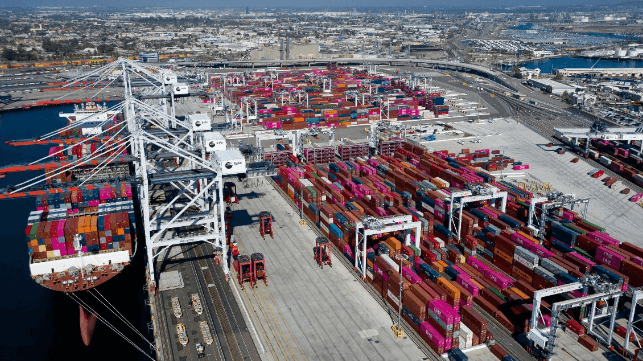Cheaper Oil, Lower Freight Rates Will Offset Tariff Impact in U.S.

World markets are still trying to adjust to the reality of a U.S. market with steep tariffs, and U.S. consumers are weighing the impact of rising prices for foreign goods. Luckily for consumers, those price hikes will likely be tempered by two things: cheaper oil, thanks to an OPEC production hike and a weakening economic outlook; and falling costs for ocean freight, thanks to reduced demand for shipping.
According to UK-based Pantheon Macroeconomics, a drop in oil prices and shipping costs will offset about one quarter of the expected inflation effects of the White House's tariffs. The consultancy's base case forecast is a one percent additional increase to consumer prices due to the tariff schedule.
Spot rates for freight to and from the U.S. have been falling since December, and the core Shanghai-LA route is now half the price that it was at the beginning of the year ($2,700 per FEU today vs. $5,500 in early January). Pantheon predicts that less expensive ocean freight will offset tariff hikes, and will take about 0.15 percent off of a key measurement of inflation, the Personal Consumption Expenditures Price Index.
Energy is also getting cheaper. West Texas Intermediate has fallen from $72 per barrel last week to $61 per barrel on Monday. "The drop [in oil prices] mostly reflects expectations that global demand will wither due to tariffs, but prices also fell after OPEC unexpectedly announced last week a bigger increase in output," explained Pantheon's chief economist Samuel Tombs in a research note.
The drop in oil prices means that domestic fuel prices will likely drop by about 14 percent, offsetting tariffs and knocking another 0.1 percent off of inflation.

that matters most
Get the latest maritime news delivered to your inbox daily.
OPEC's oil production decision comes after repeated lobbying from the White House. President Donald Trump has been asking Saudi Arabia and other OPEC producers to export more oil and lower the global cost of energy since his first week in office, citing a desire to reduce Russian oil revenue.
"[It's] his clear intention to use energy as leverage over Russia to end the war in Ukraine. That said, lower oil prices will certainly not incentivise US oil producers to 'drill, baby, drill' – particularly in high-cost Alaska," said David Oxley, chief climate and commodities economist at Capital Economics, speaking to BBC after the inauguration.
